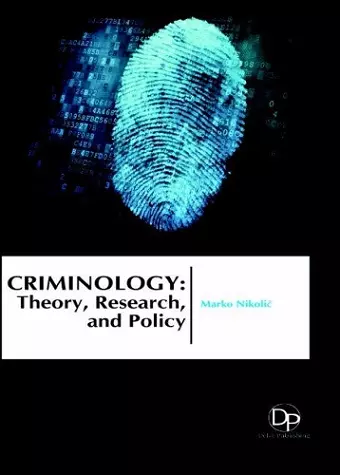Criminology
Theory, Research, and Policy
Format:Hardback
Publisher:Delve Publishing
Published:30th Nov '16
Should be back in stock very soon

Criminology (from Latin cr?men, “accusation”; and Greek -?????, -logia) is the scientific study of the nature, extent, management, causes, control, consequences, and prevention of criminal behavior, both on the individual and social levels. The term was first used in 1885 by Italian law professor Raffaele Garofalo as criminologia. In this book we will cover the bases regarding victims, crime and police in hope that this will awake the desire for further reading and studying of this legal discipline. We will start from the historical development of Criminology and Cesare Lombroso in Chapter 2 as the most colorful person in history of this discipline because he connected anthropology and crime. Although his theories are outdated his work is a must-know for every Criminologist. This is the reason he is chosen from many to be mentioned in the beginning of this book. Chapter 3 offers theoretical foundations for adopting Problem Based Learning in the study of crime and criminal justice. While problem-based learning (PBL) has been successfully used in many disciplines for over 30 years, it has not yet been widely adopted by criminal justice instructors. Chapter 4 brings partial test of Agnew’s general theory of crime and delinquency. Relying on a sample of adolescents and employing measures of the self, family, school, and peers domains, this study examines the contemporaneous and lagged effects of these four life domains on the likelihood of consuming alcohol and using marijuana. Given the increased criminalization of young people in poor communities, and the possibilities for change at this very moment, progressive criminological ideas have never been more important. Paper in the Chapter 5 discusses possible partnerships between progressive criminology and social justice organizations struggling to transform the criminal justice systems. Often people are focusing only on urban areas, research on rural communities and crime in Chapter 6 is examined as a way to criticize and challenge mainstream criminological theories and concepts like social disorganization and collective efficacy, and to remind critical criminologists of the importance for developing critical perspectives for place-based or ecological theories of crime. Some awarded experts are claiming that administrative criminology deserves much more positive appraisal than it has been given to date. You can read more about their standings in the Chapter 7 while Chapter 8...
ISBN: 9781680957853
Dimensions: unknown
Weight: unknown
206 pages